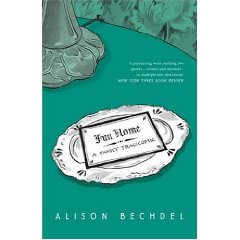Fun Home
May 8th, 2009

Fun Home
Writer and Artist: Alison Bechdel
Reviewer: Louise
“One of the most eagerly anticipated graphic memoirs of recent years, “Fun Home” is a darkly funny family tale, pitch-perfectly illustrated with Alison Bechdel’s sweetly gothic drawings. Like Marjane Satrapi’s “Persepolis”, it’s a story exhilaratingly suited to graphic memoir form. Meet Alison’s father, a historic preservation expert and obsessive restorer of the family’s Victorian home, a third-generation funeral home director, a high-school English teacher, an icily distant parent, and a closeted homosexual who, as it turns out, is involved with his male students and the family babysitter. Through narrative that is alternately heartbreaking and fiercely funny, we are drawn into a daughter’s complex yearning for her father. And yet, apart from assigned stints dusting caskets at the family-owned ‘fun home’, as Alison and her brothers call it, the relationship achieves its most intimate expression through the shared code of books. When Alison comes out as homosexual herself in late adolescence, the denouement is swift, graphic, and redemptive.” (Synopsis from Amazon.co.uk)
“Fun Home” sits in the same genre as Marjane Satrapi’s “Persepolis”. Not quite a “misery memoir” – they’re both too well-written and un-self-pitying for that – but each tells the tale of a young woman’s difficult childhood and early adulthood. Lest I give the impression that either is worthy or dull, I should say that both are sufficiently well-drawn, and laced with enough black humour and sharp observations on human nature, to make reading them, if not a comfortable experience, then certainly a rewarding one.
Fun Home, as described in the synopsis above, tells the tale of Bechdel’s difficult relationship with her father. The name is both the family’s abbreviation of “funeral home” (their family business) and an acid comment on life with the family. Peeking in at other people’s unconventional families is always something of a guilty pleasure, and her family – particularly her father – are certainly that. His obsession with restoring the family home impacts on the lives of all its inhabitants, so much so that Bechdel recounts how she herself developed obsessive-compulsive disorder during her early teens.
Her drawing and writing definitely capture the claustrophobic sense of living in a family with a Big Secret, and it’s quite a relief when she escapes to college and meets her first girlfriend. Their times together are tenderly drawn, and it is refreshing to see a relationship between two women who actually resemble real people being depicted with warmth and humanity in a graphic novel.
Reading “Fun Home” is frequently an uncomfortable experience. Apparently Bechdel carefully plotted each scene, sometimes going so far as to pose as her father in some of the scenes and have someone take photographs. You do wonder whether the book’s publication was an entirely welcome experience for the rest of her family; there are times when the reader feels very much like a voyeur.
That said, reading it does very much give a sense of the impact of society’s attitudes to sexuality on the lives of the families of people who felt forced to live a lie, yet at the same time it’s never preachy. Ultimately, “Fun Home” is about family relationships, and how they change as we grow older. All of us go through this, and if our own families aren’t as dysfunctional as Bechdel’s (or so we hope), then we still learn from seeing how, as an adult, she tried to forge a relationship with her father. The final chapter is very well-written – not a sugar-sweet ending, but realistic and containing a note of hope. Recommended.
Paperback: 240 pages
Publisher: Jonathan Cape Ltd (14 Sep 2006)
ISBN-10: 0224080512